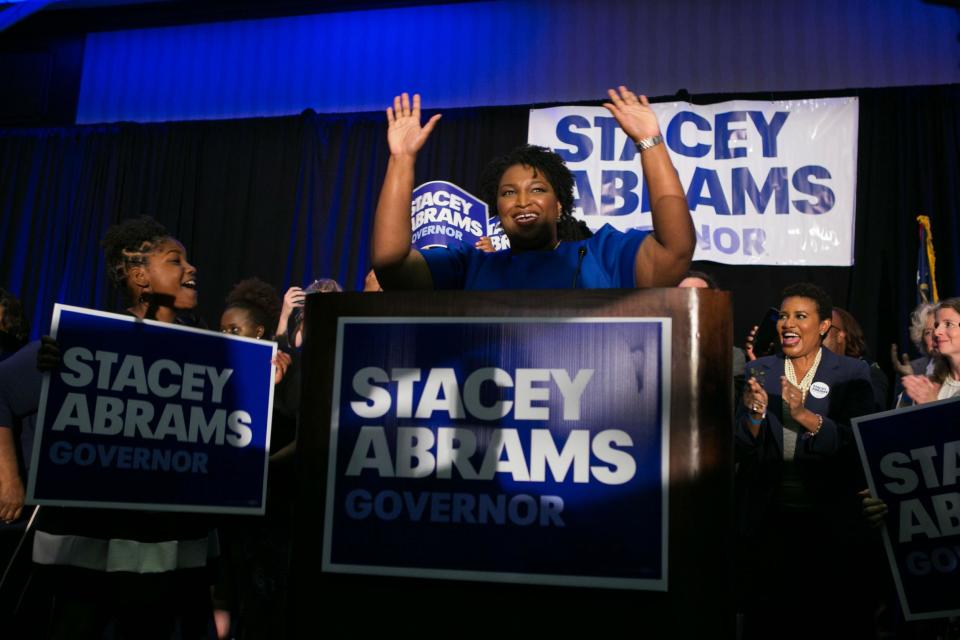History made as Democrats choose first black woman and first openly lesbian governor candidates
Activists in Georgia and Texas are celebrating history being made after a major US political party for the first time selected a black woman, and a lesbian, to challenge in races for state governorships.
Stacey Abrams, who grew up in Gulfport, Mississippi, as one of six children, beat off a challenge from a former member of the state legislature to become the Democrats’ nominee for the governor’s race in Georgia. If she wins in November, she will be the first black woman elected to a governor’s mansion.
Meanwhile, in Texas, Lupe Valpez, the former Dallas County Sheriff, won the party’s primary, and in doing so became the nation’s first openly lesbian gubernatorial candidate. Kate Brown of Oregon, who is running for reelection, is bisexual and became America’s first openly LGBT governor when she won in 2015.
Thank you, @randrewwhite and your entire team for running an incredible campaign with such passion and spirit.
I look forward to working with you all to to achieve our shared goal of giving everyday Texans a voice in Austin and beating Greg Abbott in November. https://t.co/u4c1NPQHAG— Lupe Valdez (@LupeValdez) May 23, 2018
“We are writing the next chapter of Georgia history, where no one is unseen, no one is unheard and no one is uninspired,” Ms Abrams, the former state House minority leader who earned endorsements from major politicians, told supporters on Tuesday night. “And I know for the journey ahead, we need every voice in our party – and every independent thinker in the state.”
Ms Valdez told The Independent she believed her victory showed people wanted a return to “common sense” politics. She also said she was happy to be among a group of women making history.
She said: “We have to get back to the things that work for everybody, the things work for the majority of folks.”
While the victories of Ms Abrams and Ms Valdez cheered progressives, political observers said both women faced a tough battle to convert their success in the party’s primary to wins in the general election in November.
“I was celebrating last night, but today I am working,” said Christina Greer, associate professor of political science at Fordham University in New York, who was in Atlanta to watch Ms Abrams’ win.
She said the 44-year-old had a lot of work to do as she seeks to expand black voter registration and build a viable coalition of supporters.
“If she was white and male, there would be no doubt about this contest. She is the most qualified candidate you can imagine,” she said. “But she will have to work hard to persuade both white and black people to vote for her because, in this era of Trump, people are asking if it’s possible”.
Ms Greer said for all his landmark achievements, Barack Obama never won Georgia. “And he was a man. She is a woman.”
Jennifer Duffy, a senior editor at the bipartisan Cook Political Report, said Ms Abrams, who won the night 76-23, was carrying the weight of progressives’ hopes as they “undertake a grand experiment to change the composition of the general election electorate”.
“Her success would change the way Democrats approach elections in southern states and other Republican-leaning areas with significant minority populations,” she added. “If Abrams fails, it probably sets back progressives’ efforts in these places. Abrams’ nomination sets up a very polarising general election.”
In Texas, Ms Valdez, 70, faces an equally tough challenge against the Republican incumbent governor, Greg Abbott. The HuffPost reported that Mr Abbott, who easily won the contest in 2014, has already collected $40m for his reelection campaign, while Ms Valdez’s coffers recently had as little as $200,000, a sum that ought to grow considerably now she is the nominee.
Annise Parker, a former mayor of Houston and CEO of the Victory Fund, a political action committee (PAC) that raises funds to support openly LGBT candidates for public office, said while “bigoted state legislators in Austin continue to divide the state and target our community, Texans are voting for LGBTQ candidates because we are authentic, values-driven leaders who deliver on promises”.
She said Ms Lupez’s sexuality had neither hurt or hindered her.
Yet, she said, such a result would have been unlikely even 10 years ago. “The country has changed and candidates have matured,” she said.
She said her organisation sought to back LBGT candidates in both parties – it supported one in another Texas race – but said since the election of Mr Trump, the party had become increasingly inhospitable to LBGT candidates.
“For Democrats, it’s not an issue,” she said.
The results in Texas and Georgia come as a wave of women candidates have been performing well in contests across the country, and are expected to do so in November. Earlier this month, in a series of primary ballots in Indiana, Ohio, North Carolina and West Virginia, women made up more than 19 per cent of candidates for House races.
After the votes were counted, it emerged women will make up 33 per cent of all general election House candidates in those states, a result that observers said showed women had punched above their weight.
On Tuesday, in Kentucky’s 6th congressional district, voters chose retired Marine officer and fighter pilot Amy McGrath, over Lexington Mayor Jim Gray to advance to a campaign against Republican congressman Andy Barr in November.

 Yahoo News
Yahoo News 

